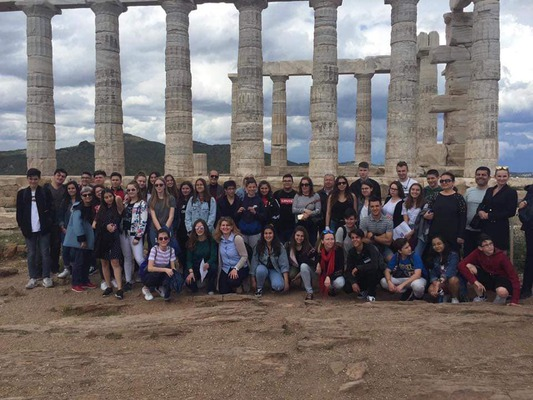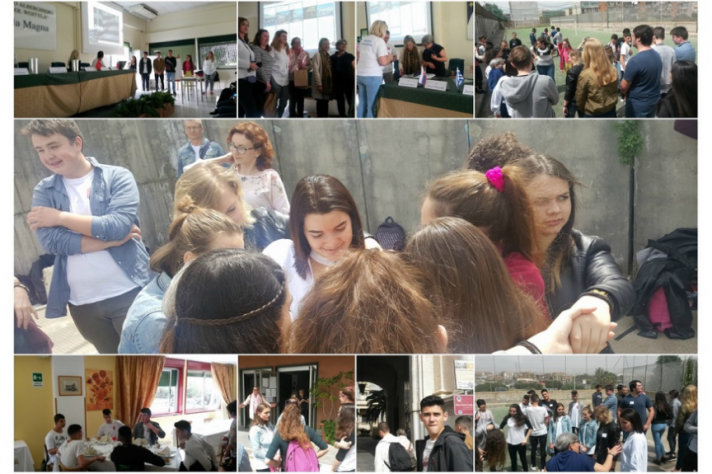
Topic(s) addressed
The Spielend neues lernen project was a continuation of an earlier successful eTwinning project that had been awarded the European Quality Label, as well as a German award for best project in 2017. This project’s aim was to motivate pupils to learn foreign languages; improve their digital skills; and, to expand the use of gaming’s activating elements in foreign language teaching and other subjects. Gamification in education forwards the use of gaming systems, new experiences, and cultural roles in motivating students to learn. All individuals who were involved in this project had the opportunity to work with Web 2.0 applications, create online games, benefit from peer-learning, and compare traditional forms of learning through gamification, with new learning resources created and published on the project’s website for other schools and teachers. The advent of the COVID-19 pandemic has compelled the teaching and learning systems of many schools to undergo drastic changes; however, due to the experience and knowledge gained from this project, we were able to effortlessly manage our online distance learning initiatives.
Target groups
The project’s participants were pupils between the ages of 14-16, and saw the participation of 58 pupils in short-term exchange programmes. These students consisted of nationals living in all 5 partner countries, including those from socially disadvantaged groups and students with learning disabilities (with both groups having also participated in online language games). Also, participating schools offered all interested students the opportunity to participate in online competitions.
Methodologies
The project’s innovative aspects lay in its use of online games and other associated activities in the teaching of German and English – an approach that proved to be stimulating for students, and which facilitated the learning process by making it a fun experience. Given that activities were image-rich and easily revised, students with learning disabilities found the experience to be particularly enjoyable, as they were able to perform tasks that were identical to those being carried out by other students with significantly lesser difficulties than they would have encountered in a regular school environment. The project’s main component revolved around the implementation of English and German lessons, with students requested to create vocabulary collections and online quizzes based on a number of selected topics. As such, students’ short-term goals were focused primarily on the game’s practical application with regard to foreign language learning and communication, with learning activities that focused on cultural aspects being an additional element. A total of 45 teachers and 58 pupils from across 5 countries participated in 5-day short-term exchange programmes that were aimed at evaluating language acquisition and digital competencies through online quizzes. Students, who worked in international teams, prepared scenarios on a number of assigned topics and created digital learning material through Learningapps, Quizzis, and Kahoot. In addition to learning how to work with 3-D printers, students’ excursion to
Samsung's development laboratory taught them how to develop mobile applications. Furthermore, they were also able to familiarise themselves with the lifestyles of teenagers from different countries, which not only facilitated the building of a team spirit, but also helped them improve their language, digital, and presentation skills. Each of these meetings also consisted of a ‘game day,’ where teams competed amongst themselves in online games and quizzes, with the last day dedicated to team evaluation and reward. The project was assessed through the use of questionnaires, with results processed during the project’s final evaluation. The use of games within the classroom environment allowed for teaching to be conducted in a simple yet amusing manner, which increased students’ self-confidence and problem-solving autonomy, while encouraging a team spirit environment. The project’s goal was to enable mobility and to facilitate durable and reusable learning methods through gamification. All of the project’s scenarios and online games are accessible to the public via the project’s website and on the eTwinning platform, with the website itself having been a guiding instrument and a valuable resource for teachers. An e-magazine was also released that contains information on the project and students’ overall experiences. Lastly, project participants from regional schools provided their collection of thematic vocabulary and developed games to teachers of foreign languages during workshop sessions.
Environments
Schools provided support by allowing students to work in the computer lab and granted them a number of dedicated hours for participation in regular online quizzes, with such activities being conducted in both a synchronous and asynchronous manner. Students were also given the opportunity to meet other students during online sharing activities or through pictures of exchange visits. Teachers shared the project’s materials and also created new materials that were disseminated and recycled in other classes, with schools that participated in the project becoming centres of innovation for the dissemination of new practices to other schools.
Teachers
Most teachers who had participated in the project were trained in gamification through various means, such as international e-Twinning meetings and Erasmus KA1-teacher training activities, with their acquired knowledge in the use of technologies facilitating new ways towards student learning. Shortly after the project’s launch, other foreign language teachers, as well as teachers of other subjects, began (through peer learning and joint cooperation) to utilise gaming activities for the learning activities of weaker students – with great success. A number of benefits were reaped by both teachers and students following their completion of the project’s educational activities, which allowed them to easily manage distance education initiatives during the pandemic. The widespread recognition among participating teachers of the benefits of gamification in the classroom environment led them to encourage their colleagues to combine traditional approaches to teaching, with the use of gamification.
Impact
As a result of this project, more than 2692 pupils from various schools were involved in online quizzes, and a total of 771 language issues were resolved, with the percentage success rate having increased from 60% to 80%. Furthermore, the exchange component provided students with the opportunity to explore other cultures on the basis of their own experiences, and increased a sense of European identity. Digital skills that were acquired taught students the ways to source needed information, and how to critically evaluate such findings. Teachers who worked on the project passed on their newfound knowledge to their colleagues, with students also having done the same among their peers; furthermore, teachers had actively put this knowledge into practice throughout the pandemic period, and trained colleagues on ways to work with web tools and of how such tools and applications may be used in distance learning approaches. The benefits of the project allowed for the implementation of a Web 2.0 class during the 2018/2019 school year, in which students utilised tablets within a blended classroom environment to facilitate learning through gaming activities and tests. As a result, students have felt more involved in the learning process as they were able to create their own classroom activities while challenging their peers. Moreover, although 2 years have passed since the project’s conclusion, its many significant effects continue to be felt to this day, with the project having imbued our school with a distinctly unique spirit.
- Reference
- 2017-1-SK01-KA219-035392_1
- Project locations
- Slovakia
- Project category
- Primary education
- Project year
- 2021
Stakeholders
Participants
12th Gymnasium Acharnon
- Address
- Greece
Istituto Professionale di Stato per i Servizi Enogastronomici e dell'Ospitalità Alberghiera "Karol Wojtyla"
- Address
- Italy
Ramazan Atıl Anadolu Lisesi
- Address
- Türkiye
Zespół Szkół w Wieleniu
- Address
- Poland

